Daniel 11:3 "And a mighty king shall stand up, that shall rule with great dominion, and do according to his will."
The mighty king is: Alexander the Great, King of Macedonia - 336 BC
According to his will points out a change of power.
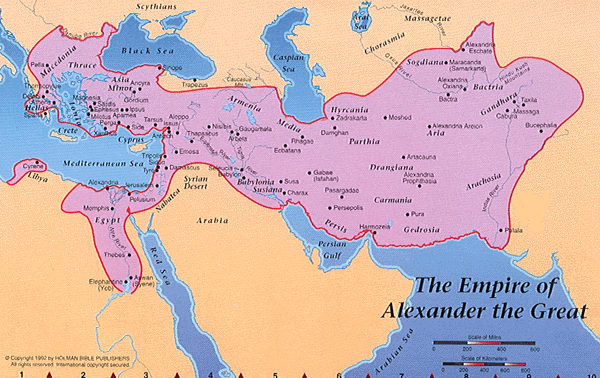
Daniel 11:4 "And when he shall stand up, his kingdom shall be broken, and shall be divided toward the four winds of heaven; and not to his posterity, nor according to his dominion which he ruled: for his kingdom shall be plucked up, even for others beside those."
Alexander the Great's empire was crippled after his death.
From his empire, Four main Hellenistic civilizations emerged:
- Egypt - Ptolemy I
- Macedon - Cassander
- Syria - Seleucid
- Thrace - Lysimachus
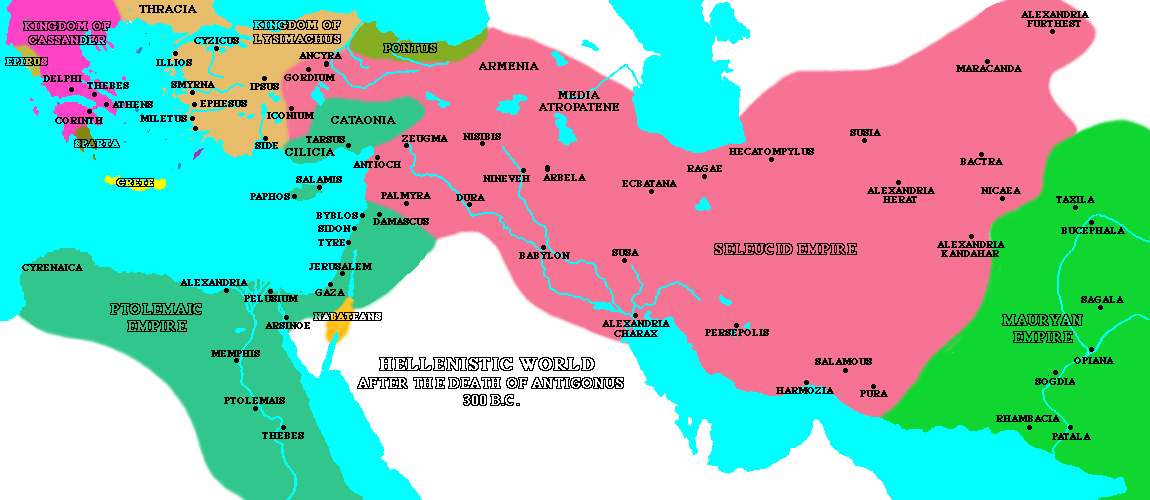
Daniel 11:5 "And the king of the south shall be strong, and one of his princes; and he shall be strong above him, and have dominion; his dominion shall be a great dominion."
Ptolemy I Soter controlled the south.
He was strong because of how far he extended his kingdom.
Seleucus I Nicator who controlled the East became stronger taking later Syria and parts of Asia Minor from Lysimachus, he then becomes king of the north.
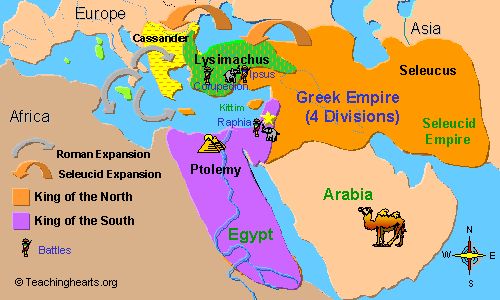
Daniel 11:6 "And in the end of years they shall join themselves together; for the king's daughter of the south shall come to the king of the north to make an agreement:"
Ptolemy II Philadelphus the next king of the south gave his daughter Berenice to be married to Antiochus II king of the north.
Daniel 11:6 "But she shall not retain the power of the arm; neither shall he stand, nor his arm: but she shall be given up, and they that brought her, and he that begat her, and he that strengthened her in these times."
Ptolemy II her father died and she lost her power of the arm.
Her husband Antiochus II would neither stand after leaving her to his first wife who ends up poisoning him.
She then will be given up for Egypt who begat her will not come in time to rescue her as Laodice brings death upon her.
Daniel 11:7 "But out of a branch of her roots shall one stand up in his estate, which shall come with an army, and shall enter into the fortress of the king of the north, and shall deal against them, and shall prevail:"
Out of her roots, is her brother Ptolemy III Euergetes who stands up in his kingdom.
He takes his army to Antioch to war against Laodice and her son Seleucus II Callinicus.
Daniel 11:8 "And shall also carry captives into Egypt their gods, with their princes, and with their precious vessels of silver and of gold; and he shall continue more years than the king of the north."
Ptolemy III Euergetes is said to have taken his army as far as Babylon.
He also lived a few years longer then did Seleucus Callinicus who died in exile from falling off his horse.
Daniel 11:9 "So the king of the south shall come into his kingdom, and shall return into his own land."
Other versions of the Bible seem to refer Daniel 11:9 as the King of the North.
If this is the King of the South:
Ptolemy III would have taken Seleucus II Callinicus whole kingdom but hearing that a rebellion was raised in Egypt required his return home, he took with him thousands of silver and gold items.
If this is the King of the North:
Seleucus II Callincus of the north wanted to get back at Ptolemy III for his military carnage. He tried to take Egypt in 240 B.C. but suffered a major defeat, including loss of his navy and returned to his own land.

Daniel 11:10 "But his sons shall be stirred up, and shall assemble a multitude of great forces: and one shall certainly come, and overflow, and pass through: then shall he return, and be stirred up, even to his fortress."
Selecus II Callinicus sons were Seleucus III Soter, and Antiochus III the Great.
The younger brother Antiochus III recovered Seleucia and Syria back from Egypt.
He went all the way to his "Ptolemy IV Philopator" king of egypt's fortress at Raphia.
Daniel 11:11 "And the king of the south shall be moved with choler, and shall come forth and fight with him, even with the king of the north: and he shall set forth a great multitude; but the multitude shall be given into his hand."
Ptolemy IV met and defeated Antiochus in the Battle of Raphia.
Daniel 11:12 "And when he hath taken away the multitude, his heart shall be lifted up; and he shall cast down many ten thousands: but he shall not be strengthened by it."
Ptolemy IV had won the battle "taken away the multitude" at Raphia.
His heart was lifted up from this vitory casting down the ten thousands.
But more confidence was given to the Egyptian rebels after winning the battle.
For Ptolemy IV was still a foreign king and many wanted their own blood to rule.
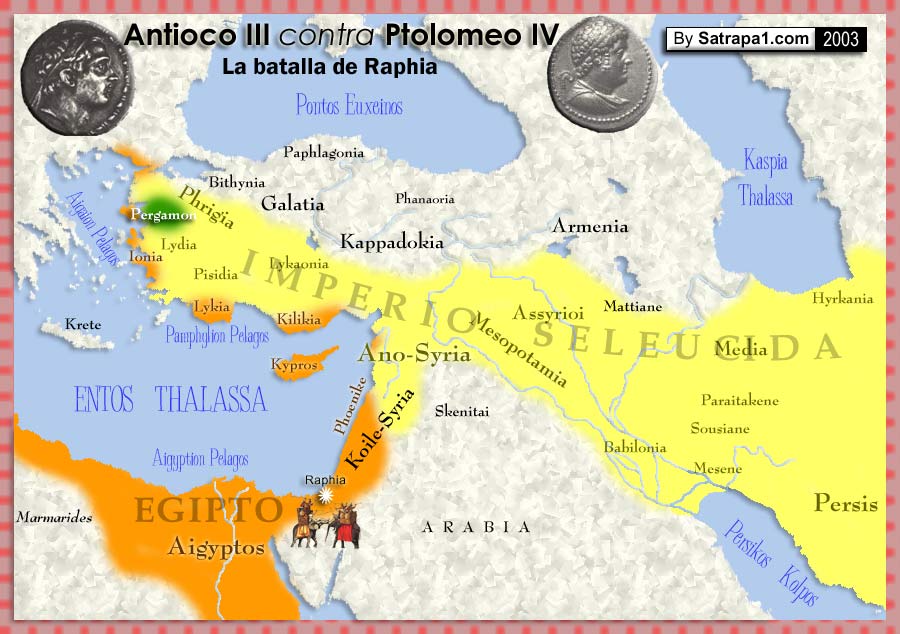
Daniel 11:13 "For the king of the north shall return, and shall set forth a multitude greater than the former, and shall certainly come after certain years with a great army and with much riches."
Ptolemy IV died and was succeeded by his son Ptolemy V Epiphanes born from his wife and sister Arsinoe.
Antiochus III comes again with a army greater then the former with hopes of a easy victory over Ptolemy at the age of five.
Daniel 11:14 "And in those times there shall many stand up against the king of the south: also the robbers of thy people shall exalt themselves to establish the vision; but they shall fall."
Those that stand up against the boy king Ptolemy V are:
1. Agathocles and Sosibius who tries to take over with the inclusion of killing Arsinoe.
2. Antiochus who joins with Philip V of Macedon with an agreement to take their neighboring territories.
3. Scopas the Aetolian, (General of Ptolemy who recaptured Judea and pushed back Antiochus) tried later in Egypt to overthrow the Government but Aristomenes had him arrested and tried by the Council.
4. The natives of Egypt and Judea were also revolting.
Satan uses many to steel from the flock of Jesus as seen in John 10:11-12
Robbers of thy people is rome?
Rome is the robbers of thy people (Daniel's people Judah) who shall exalt themselves to establish the vision.
1. It will be the forth kingdom as Daniel has seen in vision.
2. Christ will come during this time to save man as the prophets have foretold.
3. Rome with Constantine and the Roman Catholic Church will come against God's people and rob them from Him.
Robbers of thy people is a general meaning that all these nations are having a bad influence on Israel?
1. This is around the middle of the 70 week probation of Daneil 9.
2. The period which the Bible is most silent on concerning Israel.
3. Probation was not going well and apostasy led God to have Palestine crisscrossed with repeated military campaigns between the kings of the north and the kings of the south.
4 During the reign of Antiochus III, the Jewish religion was nearly exterminated.
But they shall fall:
In the coming verses you will see the word But used allot. It is offten used like it is here, the statement is that they will establish the vision But so that God's people and Daniel understands, this power will fall.
As Babylon would come and rob God's people destroying the temple so did Rome later.
I see much of the prophecy of Ezekiel 7 about Babylon as I do Rome coming to rob Gods people which again is seen in verse 22.
The same cry is being heard today. Will we listen this time or go to our destruction?
Daniel 11:15 "So the king of the north shall come, and cast up a mount, and take the most fenced cities: and the arms of the south shall not withstand, neither his chosen people, neither shall there be any strength to withstand."
So Antiochus comes back in the The Battle of Panion and recaptures Palestine and Coele-Syria from Scopas the Aetolian.
With Ptolemy's kingdom crumbling a marriage was then arranged beween Ptolemy V and Cleopatra as part of a peace treaty.
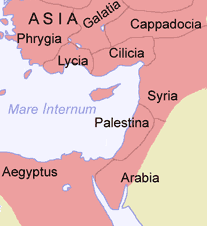
Note - this quote form here.
"It wasn't long before Antiochus IV (Epiphanies - 175-164 B.C.) ruled Syria (king of north).
In a spirit of deep anger he organized an expedition against Jerusalem. He wanted to destroy the Jews and exterminate all worship of their God. From keeping the seventh-day Sabbath to any Jew who refused to worship his idols, death was imminent. The temple was desecrated by sacrificing and worshiping a pig within its precincts. All these were reminders to God's people that their covenant with Him was being desecrated and their probation time was being squandered. The Jews had been at peace with the Ptolomies. During Ptolomy IV's reign they had translated the Torah from Hebrew into Greek for the royal library at Alexandria. This was called the Septuagint translation.
Of intense providential warning, Antiochus IV murdered any infant found circumcised and its mother - because that symbolized that they were to be a covenant-keeping people. Alas, it was only outward show. Their hearts were far from God."
Daniel 11:16 "But he that cometh against him shall do according to his own will, and none shall stand before him: and he shall stand in the glorious land, which by his hand shall be consumed."
Antiochus III now had control over much of Asion Minor down into Egypt.
But Rome after wars with Pyrrhus of Epirus and Hannibal has now become as Daniel 8:9 says "exceeding great".
Rome would do according to his own will with 53,000 loses for Antiochus and only 400 for Rome in the Battle of Magnesia.
Later Rome comes against Antiochus IV in the Battle of Pydna.
None would be able to stand before Rome as Spain to the west is also being taken under it's control.
Jerusalem is besieged and conquered by Pompey the Great as Rome then stands in the glorious land.